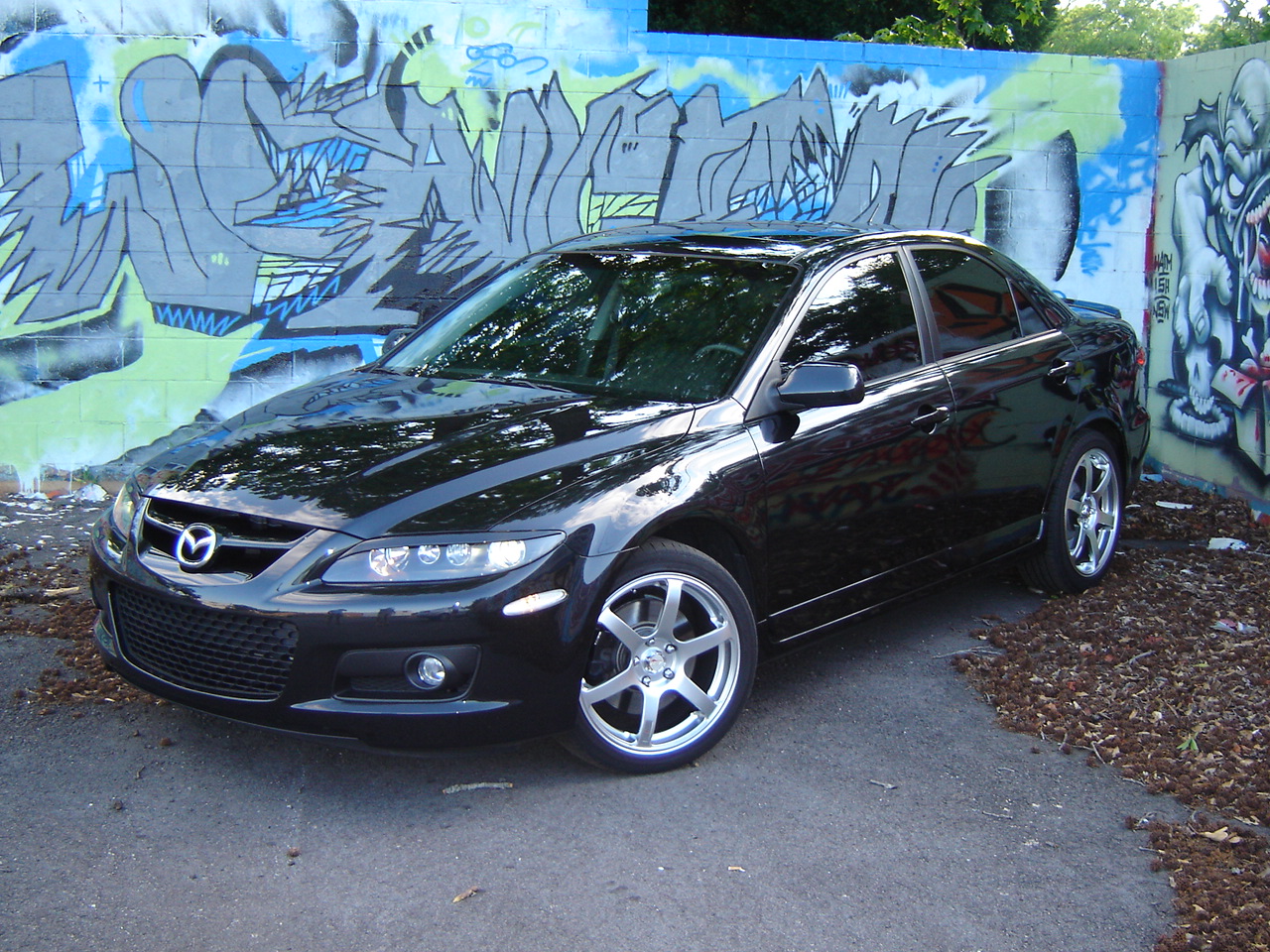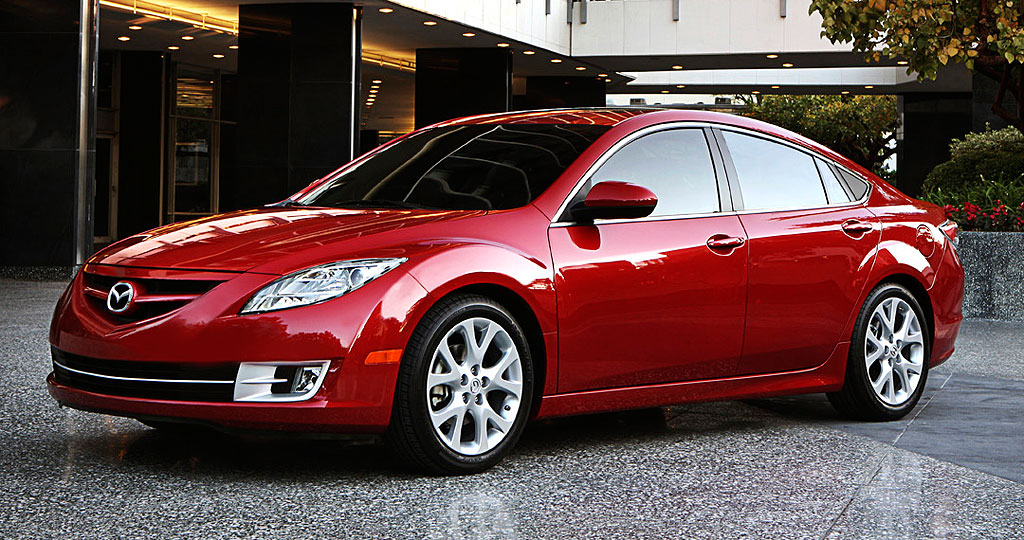1/24/11
 The Mazda6 or Mazda 6 (known as the Mazda Atenza in Japan) is a mid-size car produced by the Japanese car manufacturer Mazda since 2002. The Mazda6 has sold over one million units worldwide since its introduction, hitting that sales milestone faster than previous Mazdas.
The Mazda6 or Mazda 6 (known as the Mazda Atenza in Japan) is a mid-size car produced by the Japanese car manufacturer Mazda since 2002. The Mazda6 has sold over one million units worldwide since its introduction, hitting that sales milestone faster than previous Mazdas.The Mazda6 was the first example of the company's new Stylish, Insightful, and Spirited design philosophy followed by the Mazda2 in December 2002, RX-8 in August 2003, Mazda3 in January 2004, Mazda5 in the summer of 2005, MX-5 in October 2005, and Mazda CX-7 in November 2006. The Mazda6 is the successor of Mazda 626, also known as Mazda Capella and Mazda Cronos. The 2002 Mazda6 is essentially the 4th generation Mazda 626 as the Mazda6 continues on the G-platform, progressing from the GF-platform 626/Capella to the GG-platform Mazda6.
The Mazda6 is currently raced in the SCCA Pro Racing World Challenge GTS class. Mazda finished first in the manufacturer's championship standings.Mazda6 drivers also finished first and second in the Touring Car driver points.
The model lineup consists of a four-door sedan, a five-door liftback and a five-door station wagon, marketed in North America as the "Sport Sedan", "5-Door" and "Sport Wagon", respectively. In Australia, the lineup starts with Limited, available only as a sedan. Then comes the Classic, available in sedan, hatch or wagon. The Luxury model is next available in sedan and hatch versions. Topping the range is the Luxury Sports model, available only as a hatch. In New Zealand the lineup consisted of 2.0L GLX (sedan only), 2.3L GSX (sedan, hatch, and wagon), and the range-topping 2.3L Limited (sedan and hatch).
 When it arrived in North America, it was first sold as a 2003 model in the United States and as a 2004 model in Canada. In Europe, the luxury sports model was available as a 136 hp (101 kW) direct injection turbodiesel ("DITD") station wagon up until 2007. As of 2008, the European Mazda catalog lists only the "Sport" version of the 146 hp (109 kW) turbodiesel station wagon, while the "Luxury Sport" version has been dropped.
When it arrived in North America, it was first sold as a 2003 model in the United States and as a 2004 model in Canada. In Europe, the luxury sports model was available as a 136 hp (101 kW) direct injection turbodiesel ("DITD") station wagon up until 2007. As of 2008, the European Mazda catalog lists only the "Sport" version of the 146 hp (109 kW) turbodiesel station wagon, while the "Luxury Sport" version has been dropped.Drivetrain combinations include the Mazda MZR engine in configurations of 1.8 L (L8-DE), 2.0 L (LF-VE) and 2.3 L (L3-VE), initially with a five-speed manual or four-speed automatic transmission (with sequential-automatic option, dubbed the "Four-Speed Sport AT"). In the US domestic market a 3.0 L Duratec 30 V6 engine is also available with a five-speed manual or five-speed automatic (with sequential-automatic option, dubbed the "5-Speed Sport AT"). European and Australian versions also feature a four-cylinder turbodiesel that comes with a six-speed manual transmission and produces significantly more torque than the V6 with much improved fuel economy.
 In North America, the 5-speed automatic optional on the V6 models is replaced by an Aisin 6-speed automatic for 2005 model year. The four-cylinder model receives a Jatco five-speed automatic in the following year. Power is directed to the front wheels in most markets, although full-time all wheel drive models are available in Japan, Europe and Australia. Not all configurations are available in all areas - for example, the Mazda 6 as released in Australia is available in 2.3L four-cylinder guise only, while the 626 which it replaced was available with a choice of four or six-cylinder engines. The MZI V6 engine was only fitted to vehicles manufactured at Flat Rock, Michigan and destined for the US and Canadian domestic markets.
In North America, the 5-speed automatic optional on the V6 models is replaced by an Aisin 6-speed automatic for 2005 model year. The four-cylinder model receives a Jatco five-speed automatic in the following year. Power is directed to the front wheels in most markets, although full-time all wheel drive models are available in Japan, Europe and Australia. Not all configurations are available in all areas - for example, the Mazda 6 as released in Australia is available in 2.3L four-cylinder guise only, while the 626 which it replaced was available with a choice of four or six-cylinder engines. The MZI V6 engine was only fitted to vehicles manufactured at Flat Rock, Michigan and destined for the US and Canadian domestic markets.Just as before the Mazda 626 was renamed to Mazda6 Atenza, Ford continues to use the Mazda's G-series platform for the basis of a number of its CD3 platform coded vehicles, including the Ford Fusion, Mercury Milan, Lincoln Zephyr/MKZ, Lincoln MKX, and a range of SUVs and minivans. Ford also plans to offer a hybrid powertrain on the platform. The official Mazda chassis codes are GG (sedan/hatch) and GY (wagon) series - following the 626/Capella in its GF/GW series.

Mazda's Hofu plants in Yamaguchi Prefecture, Japan produce the Mazda6 for international markets. In North America, Mazda 6 production is handled at the AutoAlliance International plant which is a joint venture between Ford and Mazda. The first Mazda 6 rolled off this Flat Rock, Michigan assembly line on October 1, 2002, one month after 626 production ended. There are also satellite plants building Mazda 6 models in China and Thailand for their respective local markets.
In September 2005, all Australian Mazda 6's received a facelift which included a feature upgrade, 5 speed auto and 6 speed manual transmissions, standard 16" or 17" alloy wheels and minor bodywork upgrades.
In China, the Mazda6 is used as the base for the FAW Benteng, also known as Besturn or Hongqi C301, manufactured by the First Automobile Works in Jilin Province.






0 comments:
Post a Comment